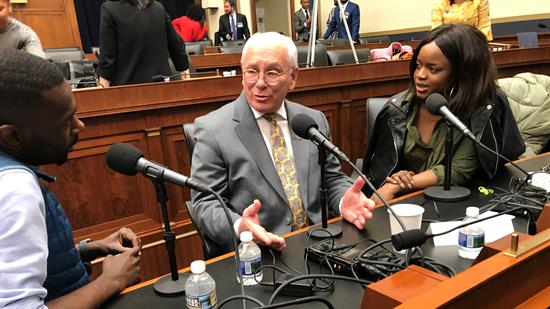- Home
- About
-
Constituent Services
- Academy Nominations
- Community Project Funding
- Congressional Art Competition
- Congressional App Challenge
- Congressional Commendation
- Event Invitation
- Grants
- Help with a Federal Agency
- Internships
- IRA Clean Energy Consumer Benefits
- Know Your Rights: Immigration
- Request a Meeting
- Request Surplus Books
- Presidential Greeting
- Visit Washington D.C.
- Issues & Legislation
- News
- 20th District
- Contact

Press Releases
Tonko Cheers $10.85 Million in Community Planning & Development Grants for NY-20 CommunitiesHUD grants will help five Capital Region municipalities build affordable housing, provide resources for those in need, and develop stronger communities
Albany, NY,
May 10, 2024
Tags:
Housing
ALBANY, NY — Congressman Paul D. Tonko announced today that the U.S. Department of Housing and Urban Development (HUD) has awarded major grants to five Capital Region municipalities totaling $10,850,870. This funding will provide flexible resources for those communities to build homes, support renters and homeowners, create jobs, and provide lifesaving assistance to those who need it most. “Throughout my time in Congress, I’ve made it a top priority to ensure our Capital Region municipalities have the resources they need to provide quality, affordable housing, deliver assistance to those in need, and build stronger, more resilient communities for all residents,” Congressman Tonko said. “This significant infusion of federal dollars will empower our municipalities to take ownership of investments in their respective communities, providing flexibility for those communities to use the funds in ways that address their locally specific needs. I’m thrilled to celebrate this exciting announcement, and I look forward to seeing how these investments will better the lives of residents across our Capital Region.” The grants awarded to Capital Region municipalities this week include: · $4,946,336 for the City of Albany, including $3,080,288 through the Community Development Block Grants (CDBG) program, $811,496 through the Housing Opportunities for Persons with HIV/AIDS (HOPWA) program, $777,834 through the HOME Investment Partnerships Program (HOME), and $276,718 through the Emergency Solutions Grants (ESG) program. · $3,379,244 for the City of Schenectady, including $2,101,045 through the Community Development Block Grants (CDBG) program, $1,093,420 through the HOME Investment Partnerships Program (HOME), and $184,779 through the Emergency Solutions Grants (ESG) program. · $1,847,415 for the City of Troy, including $1,696,538 through the Community Development Block Grants (CDBG) program and $150,877 through the Emergency Solutions Grants (ESG) program. · $345,117 for the Town of Colonie through the Community Development Block Grants (CDBG) program. · $332,758 for the City of Saratoga Springs through the Community Development Block Grants (CDBG) program. These major grants are provided through the following HUD programs: · The Community Development Block Grants (CDBG) program, which provides annual grants to states, cities, counties, and insular areas to develop stronger, more resilient communities by providing decent, affordable housing and expanding economic opportunities for low- and moderate-income residents. · The HOME Investment Partnerships Program (HOME), which supports the development of affordable housing by providing funding for municipalities to build, buy, or rehabilitate affordable housing for rent or homeownership or to provide direct rental assistance to low-income people. · The Emergency Solutions Grants (ESG) program, which provides funds for homeless shelters, assists in the operation of local shelters, and funds related social service and homeless prevention programs. · The Housing Opportunities for Persons with HIV/AIDS (HOPWA) program, which provides stable and permanent housing assistance and supportive services to low-income people living with Human Immunodeficiency Virus (HIV). The funding announced this week for our Capital Region comes as part of $5.5 billion awarded to 1,200 communities through more than 2,400 annual grants to states, urban counties, municipalities, and local organizations across the nation. This round of funding also included more than $94 million awarded to the State of New York through the programs listed above and through the Housing Trust Fund (HTF), an affordable housing production program that complements existing federal, state, and local efforts to increase and preserve the supply of decent affordable housing for extremely low- and very low-income households, including families experiencing homelessness. ### |
